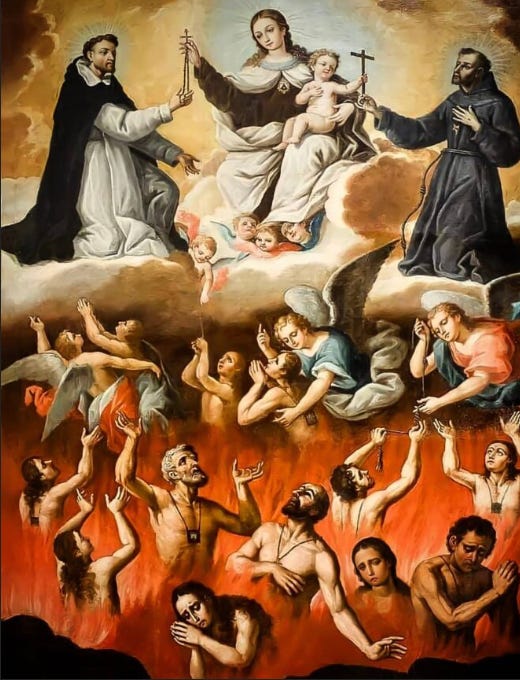“It is therefore a holy and wholesome thought to pray for the dead, that they may be loosed from sins.” -2 Macc. 12:46
Today is the feast of All Souls’ Day, when we remember all those who’ve gone before us and who still need our prayers.
Ancient Christianity believed in Purgatory, as the Catholic Church still does today. Purgatory is the place where souls who died with sins forgiven, but with too much attachment to earthly things or not enough penance performed, go to be purified before they are allowed into Heaven. After all, very few people are in a state of spiritual perfection when they die, and Rev. 21:27 says, “There shall not enter into [heaven] any thing defiled.” This is a very Biblical belief, based both in the Old and New Testaments.
In the book of 2 Maccabees, Judas Maccabeus and his men discover that some of their fellow Jewish soldiers slain in battle had symbols of idol worship hidden on their bodies, showing that they had violated the Jewish law:
“Then they all blessed the just judgment of the Lord, who had discovered the things that were hidden. And so betaking themselves to prayers, they besought him, that the sin which had been committed might be forgotten. But the most valiant Judas exhorted the people to keep themselves from sin, forasmuch as they saw before their eyes what had happened, because of the sins of those that were slain. And making a gathering, he sent twelve thousand drachms of silver to Jerusalem for sacrifice to be offered for the sins of the dead, thinking well and religiously concerning the resurrection,(For if he had not hoped that they that were slain should rise again, it would have seemed superfluous and vain to pray for the dead,) And because he considered that they who had fallen asleep with godliness, had great grace laid up for them. It is therefore a holy and wholesome thought to pray for the dead, that they may be loosed from sins. [2 Macc. 12:41-46].”
Jesus also refers to the concept of Purgatory more indirectly, since sins require penance even after they’re forgiven (Matt. 5:25-26):
“Be at agreement with thy adversary betimes, whilst thou art in the way with him: lest perhaps the adversary deliver thee to the judge, and the judge deliver thee to the officer, and thou be cast into prison. Amen I say to thee, thou shalt not go out from thence till thou repay the last farthing.”
Church Father Tertullian c. 208 AD was among those who early on applied this passage to Purgatory and its purification.
The apparition of the Blessed Virgin in Portugal known as Our Lady of Fatima mentioned Purgatory. When young Lucia asked if her dead friend were in Heaven, Our Lady responded, “She will be in Purgatory until the end of the world.” If even a little girl could have to spend so much time in Purgatory, what about the rest of us?
The good news is that, as we note in 2 Maccabees, we here on earth can offer prayers and sacrifices to lessen the time our loved ones spend in Purgatory. And just as Judas Maccabeus sent “twelve thousand drachms of silver to Jerusalem for sacrifice to be offered” for his slain comrades, the Catholic Church encourages indulgences, particularly prayers or donations which can merit the lessening of punishment in Purgatory (the early Church Fathers emphasized prayer and almsgiving as ways to obtain remission of sins). There are, unfortunately, examples of this practice of indulgences being abused, as every good thing can be abused, but it is still a beautiful Biblically-based devotion.
So today we pray for those who died as good Christians but still owed some little—or great—penance to God. For, as the Bible says, it is a “holy and wholesome thought to pray for the dead.”




